Smart Alpha portfolios Powered by J.P. Morgan Asset Management .
Smart Alpha portfolios combine Nutmeg's core investment principles, ETF and fractional investment expertise, with the in-house, multi-asset knowledge and experience of one of the world's leading investment houses.
150+ years of J.P. Morgan Asset Management experience

Globally diversified

Managed by experts

Smart Alpha portfolios
Nutmeg has partnered with its affiliate company J.P. Morgan Asset Management for the exclusive launch of Smart Alpha investment portfolios. With Smart Alpha portfolios we're combining Nutmeg's core investment principles, ETF and fractional investment expertise with the in-house, multi-asset knowledge and experience of one of the world's leading investment houses.
Smart Alpha portfolios, in a nutshell
Who's it for?
'I want to seek additional returns through smart, transparent security selection in my portfolio'
What do the portfolios contain?
Globally diversified portfolios of exchange traded funds (ETFs) designed to align with your risk preference and goals. The Smart Alpha portfolio range is unique by introducing research-driven security selection. Alongside passive ETFs, the Smart Alpha portfolios also include innovative active ETFs that benefit from J.P. Morgan Asset Management's research expertise and global team's experience.
Is there ongoing management?
Yes, the asset allocation of these portfolios is set and adapted over time by our in-house investment team, who actively managed these portfolios. They make tactical adjustments informed by the research of J.P. Morgan Asset Management, who have a 150-year history of investment expertise. The selection of underlying funds is also informed by J.P Morgan Asset Management, leveraging innovative active ETFs that seek to outperform the market benchmark by going slightly overweight or underweight in positions based on the views of J.P. Morgan Asset management research analysts.
Risk levels
Choose from five risk levels, low to high, to reflect your risk appetite.
Powered by

Is my money locked in?
No. You can have access to your money in a few days, at any time, with a stocks and shares ISA or general investment account. Pension, Lifetime ISA and Junior ISA have withdrawal restrictions and conditions that may apply.


Meet our investment styles
How we manage your investments is up to you. We have six styles, and you choose which one best supports your strategy, personal priorities, and long-term financial goals.

Fully managed
Your portfolio in expert hands.

Thematic Investing
Invest in trends shaping the future.

Smart Alpha powered by J.P. Morgan Asset Management
An extra layer of active management.

Socially Responsible Investing
Aim to invest more mindfully.

Fixed Allocation
Automated rebalancing for a lower cost.

Income investing
A monthly payout from your ISA or GIA.


Past performance and asset allocation
Below you can see a detailed breakdown of our performance, as well as an indication of how our investments are allocated across global financial markets.
- Track record
- Asset allocation
- Countries allocation
Track record
Explore our full 3-year track record for each of our 5 risk-based Smart Alpha portfolios and see how our results compare against our competitors.
The past performance shown represents a composite of asset-weighted average returns for Nutmeg client portfolios, net of all fees. A composite return represents the average return of all client accounts for a given risk level on a given day, weighted by assets. Past performance is not a reliable indicator of future performance.
*The annualised figure is the return since inception expressed as a compound annual rate. For example, a portfolio with an annualised return of 6% corresponds to an actual return of 19.1% over three years (rather than 18% as you might expect) due to the effect of compounding.
Capital at risk.
Our fees
We don’t charge you anything to join Nutmeg. The only fee you'll pay is for us to manage your money, plus the cost and market spread of the funds we buy into for you – no hidden surprises.
Your fees will be paid from your pots automatically each month, so there's no extra admin, and you can always check the app to see how much you're paying.
Most people ask us...
So, what is different about Smart Alpha portfolios?
So, what is different about Smart Alpha portfolios?
Like our Fully Managed and SRI portfolios, Smart Alpha portfolios follow a dynamic investment philosophy. However, what makes Smart Alpha portfolios unique is the introduction of research-driven security selection, using J. P. Morgan Asset Management's market insights and analysis to make tactical adjustments over time. This partnership embodies our belief that asset allocation is the single most important decision facing every investor. By launching Smart Alpha portfolios we are bringing a new dimension to our investment offering: active, research-driven, security selection.
Why J.P. Morgan Asset Management?
Why J.P. Morgan Asset Management?
J.P. Morgan Asset Management, our affiliate company, is one of the world’s leading asset managers, with a history stretching back more than 150 years, and offers both specialist multi-asset expertise and the research and insights of 1,000+ global investment professionals.
In October 2021 Nutmeg became part of the J. P. Morgan group. This acquisition will not affect either the strategy or ongoing management of the Smart Alpha Portfolios
What does ‘active, research-driven, security selection’ mean?
What does ‘active, research-driven, security selection’ mean?
Alongside passive ETFs, Smart Alpha portfolios include innovative ‘active’ ETFs that benefit from the insights of J.P. Morgan’s Asset Management global team of research analysts who seek returns in excess of the respective market benchmark through security selection. These ETFs are built and managed by J.P. Morgan Asset Management and seek to offer the diversification, transparency and cost benefits of passive ETFs, alongside the opportunity to seek returns in excess of the market (known as ‘alpha’) through research-driven security selection.
This means the ETFs can take overweight positions (positions larger than the benchmark position) in securities expected to do well, and underweight positions (positions smaller than the benchmark position) in securities expected to do poorly. Any additional risk is carefully controlled.
